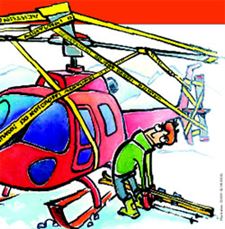
Recent headline news in my local newspaper read: Swiss government is considering banning helicopter skiing across the nation. It wasn’t the first time such a measure was officially considered. Back in 2000 a group of “ecolos,” as environmentalists are dubbed in French, led by an organization called Pro Natura and backed by the WWF, proposed the same ban. But in the end, the Swiss federal authorities decided to vote for the status quo.
Heli-skiing in Canada is different from heli-skiing in the Alps. As an indication of how little the subject is understood here in Switzerland, the French language newspaper Le Nouvelliste ?atly declared that “Switzerland is the last country in Europe to allow helicopter skiing.”
Duh. It’s true that the sport is completely banned in France. But Austria offers lifts to the Orgelscharte and Mehlsack mountains, Sweden advertises midnight sun heli-skiing at Riksgransen and even the low-lying mountains of Slovenia are alive with the chop of rotors. Italy also has helicopter terrain, especially in Valgrisenche and the Monta Rosa region around Alagna—in my experience the least expensive and most rewarding of all areas in the Alps.
Switzerland has 42 legally designated landing zones in the mountains, 19 of them right here in the canton of Valais, which is why the locals are so concerned. Choppers are only allowed to land at one of these speci? c “altiports.” They cannot pick up and deposit skiers for multiple runs, which means heli-skiing is mostly a one-bang-for-yourbucks deal. Almost all of these landing zones are easily accessible by ski tourers, which sometimes means considerable traf? c when there’s only one way down.
In Canada, a single heli-skiing concession from the B.C. government—such as Mike Wiegele in the Monashee and Cariboo ranges—is larger than all the lift-served skiing terrain in Switzerland and skiers are in true wilderness. The chopper can drop them anywhere, and pick them up mid-slope when powder turns to crust.
A few winters ago, for example, I was skiing with two friends in an off-piste couloir when one fell and broke his shoulder. One phone call and within 20 minutes he was jabbed with morphine and winched up before my eyes, not having moved an inch from where he fell. Such rescues are a matter of daily routine in Swiss resorts.
But these rescue skills and services are under attack. Pro Natura and the WWF are pressuring the Swiss government to ban not only the selfindulgent sport of heli-skiing, but all ?ights to any of the 42 currently legal landing zones at high altitude. This would mean an end to provisioning ? ights—which account for three times as many ?ights as skiers do—to skitouring huts operated by the Swiss Alpine Club. And, according to Jo Pouget of Air Glaciers, one of the biggest helicopter companies, it would also damage the rescue services. He argues that it’s precisely by flying heli-skiers that pilots hone their mountain skills, and also that without the income from heli-skiing excursions many pilots would turn to other occupations.
The economic argument carries a lot of weight in Switzerland, where winter tourism is already struggling. Swiss mountain guides claim that heli-skiing accounts for a third of their income. Swiss resorts advertise the heliskiing option as an extra simply not available in France. But the environmental lobby is adamant that ?ora and fauna count more than francs.
Switzerland’s Green Party was the ?rst in Europe to win parliamentary seats back in 1979. And a recent poll shows that a majority of Swiss would like to see the Greens given one of the nation’s seven seats on the governing federal council. But pro-helicopter interests have not yet surrendered.
Noting increasing opposition to long-haul international flights because of high-altitude pollution, one mountain guide I questioned said, “If they do ban heli-skiing here, that will just mean thousands of people ?ying to British Columbia to ski there—and how good will that be for the global environment?”



